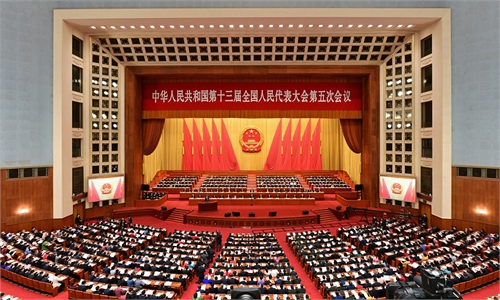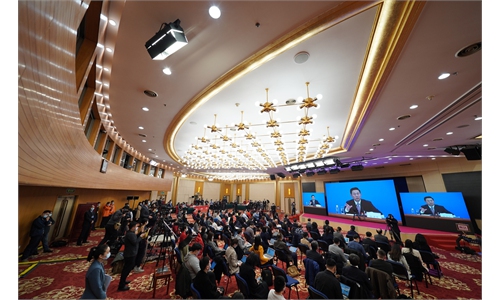West misreads China’s two sessions due to lack of knowledge, malicious interpretation: Danish scholar

Targeting China. Illustration: Liu Rui/Global Times
Editor's Note:
The West tends to interpret everything from China's political system to governance policies negatively and has even formed an "accusation industry" as Jan Oberg (Oberg), director of Sweden-based think tank Transnational Foundation for Peace and Future Research, put it. This is also the case when it comes to the two sessions. Why is there such a phenomenon? What consequences will the West bring itself if it blindly continues to shape China as a "threat?" Oberg shared his views with Global Times (GT) reporter Yu Jincui via email.
GT: China's two sessions are supposed to be a window to understand China's development and policies, just like the world observing US governance and policies through Congress. However, when mainstream Western media outlets report on this political event, they first of all emphasized the two sessions as a "rubber-stamp parliament." How do you see this practice? Is it because of a lack of knowledge about China's system or is it a kind of deliberate malicious interpretation?
Oberg: I believe it is a combination. The West/US believes that there is only one type of democracy, namely its own, based on multi-party parliaments, free elections of representatives selected by these parties and a culture of tolerant dialogue taking losers into account. These principles are laudable, but in reality, they are distorted. Furthermore, they cannot be universalized because political thinking differs from culture to culture - and differences are something we should dialogue about, not fight each other about.
Secondly, there is no doubt in my mind - because I have studied the US-orchestrated and -financed Cold War on China agenda - that it is a deliberate policy to convey only negative aspects of China. This prevents a constructive dialogue about how to solve humanity's common and much more important issues.
GT: You said that in the mainstream Western media, all you read and hear are negative reports about China's development, ruling party and policies, and the West has even formed an "accusation industry" against China. Why is there such a phenomenon and how to offset the negative effects it could generate?
Oberg: Well, this is very complicated. One, I have written a bit about what I believe is a fact - namely that the Western Christian culture seems to have a built-in need for images of enemies. Just see how it decided to expand NATO instead of closing it down when the Soviet Union and the Warsaw Pact disappeared in 1989-90. See how it has run its global war on terror since 2001 but never asked: Why did someone want to hit the US economic, military and political centers?
And culturally, there is this eternal dichotomy of "We/Good" and "Them/Evil" - not "us humanity" - perhaps rooted in the Christian missionary idea that "they" must become like us.
Finally, I think this is so rampant now because - at least in the collective subconscious of the West - there is a sense of decline and coming fall. The world's last dominant Empire must blame somebody else for that decline. That also means negating diversity and watering down everything to one narrative on "truth." The world needs unity in diversity, but the West - unwisely - promotes unity in uniformity which leads to intellectual stagnation and loss of constructive long-term vision. That's the opposite of global leadership!
GT: China projected defense spending growth of 7.1 percent this year during the two sessions. Some Western media outlets and Westerners accused China of being a threat to world peace by making a "substantial increase" in its defense budget. But China's defense expenditure as a share of its GDP has been far below 2 percent. Is it fair to always interpret China's military spending growth from the perspective of "China threat?"
Oberg: I am a peace researcher strongly inspired by the ethics of nonviolence of Gandhi and the Transnational Foundation for Peace and Future Research that I am the co-founder and director of which is devoted to promoting the UN Charter's Article 1. It states that "peace shall be established by peaceful means" and only when everything has been tried and proved to be in vain shall the UN intervene with violent means. That is, violence should be the last resort.
I'm very pleased that China repeatedly emphasizes the importance of the UN and international law, not the US "rules-based" international order - and argues so strongly for a ceasefire, dialogue, diplomacy and humanitarian aid in one package concerning Ukraine.
However, it's my humble view that all countries put too much emphasis on weapons and too little emphasis on early warning, civilian conflict-resolution, mediation, reconciliation and building a citizens-based culture of peace. Humanity will always have conflicts but we would do wise to put more civilian tools and fewer hammers into our toolboxes. Weapons and wars stimulate hubris and make conflict-resolution and peace more difficult. See the West as one big warning!
China's armament will always be seen by the West as provocative. Why? Because everybody mixes up military capabilities with intentions. A will always say that B's military capabilities are indicative of bad intentions and therefore A must arm while B will see its own military capabilities as peaceful and for "deterrence;" it cannot understand why B sees it as aggressive. That is how enemy images and arms races go on forever.
Look at Ukraine today and the West's re-armament. Gandhi is spot on: "An eye for an eye will one day make the whole world blind." So, while I agree that China's per capita military expenditures and its military's percentage of GDP are better than that of the West, I believe humanity would love China if it became the first to propose a new model for global security and peace. The NATO model is as outdated as it is dangerous.
That is why I think that the BRI is a brilliant idea: If we cooperate in win-win and not win-lose and get to know each other across various divides, we reduce the probability of hatred, misunderstandings and war.
GT: You said seeing enemies everywhere - indeed needing enemies - is a sign of a weak, fragmented society. Can the West's problems be solved by shaping or fabricating external enemies? How will blindly shaping external threats affect the development of the West itself?
Oberg: The West seems unaware now of just how self-destructive its policies are. Take the present crisis in Europe: In less than 24 hours, the US/NATO/EU responded with all kinds of open-ended punishments on Russia. It's immediate, hateful, knee-jerk tit-for-tat; no analysis of long-term consequence can have been made in such a short time.
And it's very sad and a bad omen that the fragmented West can only unite in its hate of others.
I believe that there are no serious threats to the West but that it is declining due to its illusions about itself and the world, its paranoia and militarist policies.



